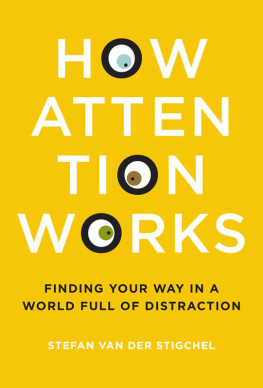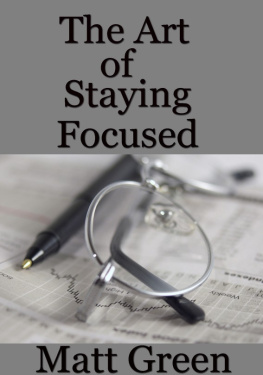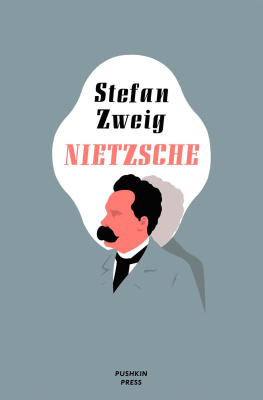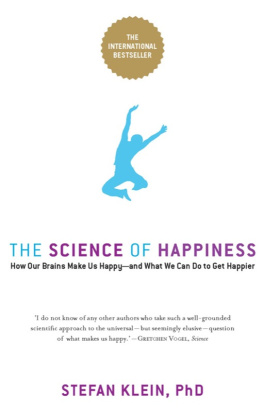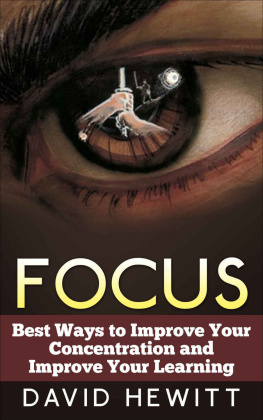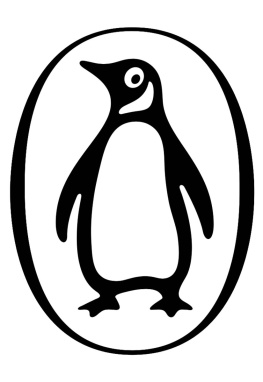Stefan Van der Stigchel - Concentration: Staying Focused in Times of Distraction
Here you can read online Stefan Van der Stigchel - Concentration: Staying Focused in Times of Distraction full text of the book (entire story) in english for free. Download pdf and epub, get meaning, cover and reviews about this ebook. year: 2020, publisher: MIT Press, genre: Religion. Description of the work, (preface) as well as reviews are available. Best literature library LitArk.com created for fans of good reading and offers a wide selection of genres:
Romance novel
Science fiction
Adventure
Detective
Science
History
Home and family
Prose
Art
Politics
Computer
Non-fiction
Religion
Business
Children
Humor
Choose a favorite category and find really read worthwhile books. Enjoy immersion in the world of imagination, feel the emotions of the characters or learn something new for yourself, make an fascinating discovery.

- Book:Concentration: Staying Focused in Times of Distraction
- Author:
- Publisher:MIT Press
- Genre:
- Year:2020
- Rating:5 / 5
- Favourites:Add to favourites
- Your mark:
- 100
- 1
- 2
- 3
- 4
- 5
Concentration: Staying Focused in Times of Distraction: summary, description and annotation
We offer to read an annotation, description, summary or preface (depends on what the author of the book "Concentration: Staying Focused in Times of Distraction" wrote himself). If you haven't found the necessary information about the book — write in the comments, we will try to find it.
Concentration: Staying Focused in Times of Distraction — read online for free the complete book (whole text) full work
Below is the text of the book, divided by pages. System saving the place of the last page read, allows you to conveniently read the book "Concentration: Staying Focused in Times of Distraction" online for free, without having to search again every time where you left off. Put a bookmark, and you can go to the page where you finished reading at any time.
Font size:
Interval:
Bookmark:
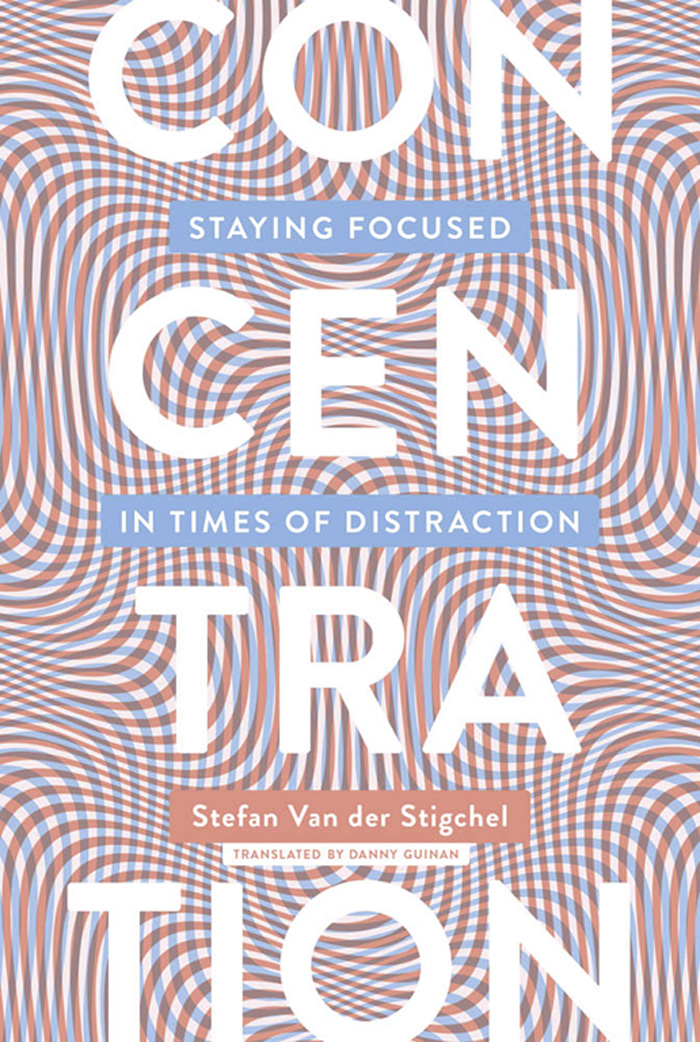
Stefan Van der Stigchel
Translated by Danny Guinan
The MIT Press
Cambridge, Massachusetts | London, England
Copyright 2018 by Maven Publishing, Amsterdam, The Netherlands
First published in the Netherlands under the title Concentratie: Gefocust blijven in tijden van afleiding
Text copyright 2018 by Stefan van der Stigchel
This publication has been made possible with financial support from the Dutch Foundation for Literature.

All rights reserved. No part of this book may be reproduced, transmitted, broadcast or stored in an information retrieval system in any form or by any means, graphic, electronic or mechanical, including photocopying, taping and recording, without prior written permission from the publisher.
This book was set in ITC Stone Serif Std and ITC Stone Sans Std by Toppan Best-set Premedia Limited.
Library of Congress Cataloging-in-Publication Data
Names: Stigchel, Stefan van der, author.
Title: Concentration : staying focused in times of distraction / Stefan Van der Stigchel ; translated by Danny Guinan.
Other titles: Concentratie. English
Description: Cambridge, Massachusetts : The MIT Press, [2020] | Includes bibliographical references and index.
Identifiers: LCCN 2019025808 | ISBN 9780262538565 (paperback) | ISBN 9780262357838 (ebook)
Subjects: LCSH: Attention. | Cognitive psychology. | Social media--Psychological aspects.
Classification: LCC BF322 .S7513 2020 | DDC 153.7/3--dc23
LC record available at https://lccn.loc.gov/2019025808
10 9 8 7 6 5 4 3 2 1
d_r0
My experience is what I agree to attend to. Only those items which I notice shape my mind.
William James, The Principles of Psychology, vol. I
Prologue
1Why Is It Difficult to Concentrate?
2When and When Not to Multitask
3The Sender: How Do You Hold Someones Attention?
4The Receiver: How Can You Improve Your Concentration?
5The Importance of Concentration in Traffic
6The Future: Are We All Going Stir-Crazy?
Hope for the Future
Acknowledgments
Notes
Index
In the first century AD, the Roman philosopher Lucius Annaeus Seneca came to the conclusion that there was too much information out there. There were so many books in circulation at the time that Seneca was worried that the abundance of information was becoming a major source of distraction. The same problem resurfaced in Germany in the 18th century when there was serious talk of a Bcherseuche a plague of books. The fear was that because there was so much information available, it might have a damaging effect on peoples concentration.
Each new kind of media brings with it new questions, from the invention of the printing press to the rise of todays digital society. Concerns as to the effect of increasing amounts of information on our concentration are nothing new, and each time a new advance is made, people fear that we may be reaching the limits of our brains capacity. Up to now this has not been the case, but the fear that we are fast approaching that moment is more understandable now than ever before. Our society is currently undergoing massive changes. Whereas in the eighties and nineties we spoke about information in terms of kilobytes and megabytes, today its all zettabytes and yottabytes. The pile of information is growing ever higher and it is encroaching more and more upon our daily lives thanks to the speedier networks, advanced storage methods, and faster processors that we carry around in our pockets. Google and Facebook know exactly what your interests are because they can track your online behavior, which means that the advertisements you see are selected on the basis of your personal tastes. (I always give myself a bit of a fright every time I accidentally click on a website banner because I know that Google will react by sending me ads based specifically on that click.)
The incredibly fast pace of digital change and the increasing amount of available information means that right now we find ourselves in the middle of an attention crisis. If you dont believe me, just take a look at the number of books and articles that are published every week warning us of the disastrous consequences of social media and smartphones for our creativity, productivity, and concentration. The market for books on digital detox is huge because of the stress people are experiencing as a result of the continuous distraction of social media. At the same time, the number of traffic accidents continues to rise, thanks to our addiction to the smartphone, and the number of children who have trouble sleeping because they are glued to their screens at night is on the rise, too. Ever since the publication of my previous book, How Attention Works, in 2019, in which I explained the basic principles of attention, I have been asked the same question over and over again during interviews and readings: what is the effect of a rapidly changing society on our ability to concentrate? This appears to be a very important question for many. A lot of people find it difficult to concentrate these days because of the consistently high level of distraction and the never-ending stream of information that washes over us every minute of every day.
Todays children are growing up in a world that is a lot different from how the world was only twenty years ago. Teenagers are massive consumers of social media and other attention distractors, and this continuous yet subtle pulling on a teenagers attention happens in a phase when their brain has not yet fully developed, with the result that they end up using their attention the wrong way. All it takes is one moment of mental weakness or boredom and out comes the smartphone. Just when they have settled down to concentrate on their studies, the sound of an incoming message is there to distract their attention again. It is no wonder that more and more teachers are complaining about how difficult it is becoming to attract and hold their students attention. The competition from smartphones is simply overwhelming, even when they are banned from the classroom.
The smartphone is also becoming more and more intrusive in our homes. Even parents are finding it difficult to spend enough time with their children. One bleep from their phone can cause them to abandon the Lego house they were building with their child, and it can then take an age before they are able to refocus their attention on what they were doing. Sometimes even that is too much to ask. The bleep might be a message from a colleague that either spoils the mood or forces Mum or Dad to turn their attention to their work again.
Not all of the doom scenarios sketched in self-help books and the media are accurate, of course. A lot of nonsense is being spouted these days, and there is absolutely no reason to believe that we are all going to end up suffering from digital dementia or that our intelligence levels are eventually destined to plummet. However, this does not mean that everything is hunky-dory either. Our tendency to multitask and the endless stream of information we are subjected to means that many of us have great difficulty concentrating. But there is also some good news: the rise of the digital society has come paired with another development, namely our increased knowledge of our behavior and of the brain. Our understanding of how concentration works is getting better and better, and this is helping us to figure out how to use it in the most optimal manner possible. The solution to the problem of what our society needs to do to be able to deal with the never-ending stream of information lies in our own hands. It is simply a matter of making the right choices.
Next pageFont size:
Interval:
Bookmark:
Similar books «Concentration: Staying Focused in Times of Distraction»
Look at similar books to Concentration: Staying Focused in Times of Distraction. We have selected literature similar in name and meaning in the hope of providing readers with more options to find new, interesting, not yet read works.
Discussion, reviews of the book Concentration: Staying Focused in Times of Distraction and just readers' own opinions. Leave your comments, write what you think about the work, its meaning or the main characters. Specify what exactly you liked and what you didn't like, and why you think so.

